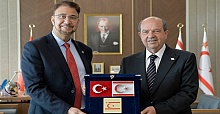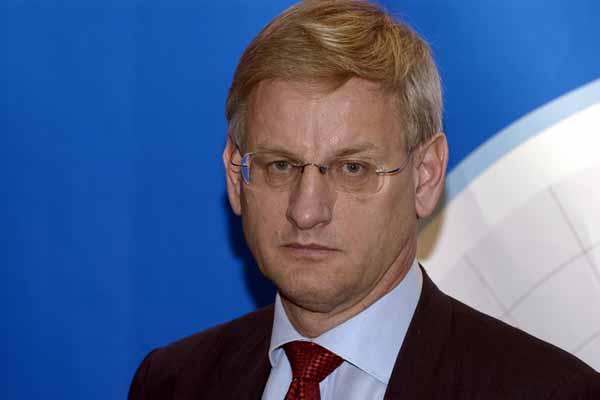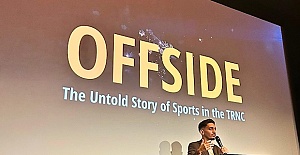Swedish Foreign Minister Carl Bildt was accused on Friday of passing secret information on government talks and nuclear policy to the United States in the 1970s - but he dismissed the report as "banal" and "hardly sensational". Newspaper Aftonbladet said documents from anti-secrecy website Wikileaks showed Bildt gave confidential details to a U.S. envoy about negotiations to form a coalition government in 1976. The information also included details about the Swedish government's attitude at the time to a possible referendum on nuclear power, the newspaper added. Bildt, a high profile former prime minister and Balkan war mediator, stopped short of denying he had ever passed on any information.
But he wrote on his blog: "Hardly sensational. Quite normal diplomatic reporting. Very banal information ... And nothing which deals with things that can be called 'secret'."
Bildt was an aide to one of the parties involved in the 1976 talks.
Another newspaper, Expressen, reported in February last year WikiLeaks was poised to out Bildt as a U.S. spy - but he dismissed that report as a smear campaign.
Expressen said Wikileaks would release the information to punish the Swedish government if the website's founder Julian Assange was ever extradited from Britain to Sweden and on to the United States.
Assange has taken refuge in the Ecuadorean Embassy in London since June to avoid extradition to Sweden to face sex crime charges. He says he fears the case is a ruse to get him to Washington to be prosecuted for his organisation's leaking of hundreds of thousands of sensitive U.S. documents.
Bildt, 63, has been foreign minister since the current centre-right coalition government returned to power in 2006.
Aftonbladet, which tends broadly to support the opposition, said in a leader article Bildt's reported actions in the 1970s were "careless" given Swedish-U.S. relations had only years previously been tense over the Vietnam war.


 CTCA UK Condemns the Political Forcing Out of Afzal Khan MP for Engaging with Turkish Cypriots
CTCA UK Condemns the Political Forcing Out of Afzal Khan MP for Engaging with Turkish Cypriots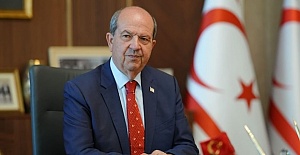 Tatar: “Reaction to MP’s TRNC visit is yet another stark example of the Greek Cypriot leadership’s primitive and domineering mentality”
Tatar: “Reaction to MP’s TRNC visit is yet another stark example of the Greek Cypriot leadership’s primitive and domineering mentality” Margaret Greer has been sworn in as the new Mayor of Enfield
Margaret Greer has been sworn in as the new Mayor of Enfield Prime Minister Keir Starmer's 2025 Easter message
Prime Minister Keir Starmer's 2025 Easter message Team Enfield ranks fifteenth the in London Youth Games
Team Enfield ranks fifteenth the in London Youth Games Parking enforcement boosted with more officers on patrol in Enfield
Parking enforcement boosted with more officers on patrol in Enfield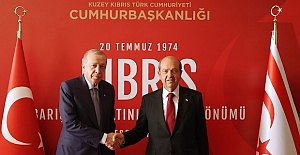 Ersin Tatar meets with President Erdoğan
Ersin Tatar meets with President Erdoğan President Ersin Tatar Holds Ministerial-Level Meeting with UK Minister for Europe
President Ersin Tatar Holds Ministerial-Level Meeting with UK Minister for Europe UEFA Europa League and UEFA Conference League draws to be combined into one single show
UEFA Europa League and UEFA Conference League draws to be combined into one single show EuroLeague schedule for 2025-26 season announced
EuroLeague schedule for 2025-26 season announced Zeynep Sonmez becomes first Turkish tennis player to reach third round at Wimbledon
Zeynep Sonmez becomes first Turkish tennis player to reach third round at Wimbledon European champions Arsenal Women will play all of their league matches at the Emirates Stadium
European champions Arsenal Women will play all of their league matches at the Emirates Stadium Enfield Labour welcomes the completion of A10 average speed cameras extension.
Enfield Labour welcomes the completion of A10 average speed cameras extension. TfL opens 2025 grants for community groups to encourage more walking, cycling and active travel in the capital
TfL opens 2025 grants for community groups to encourage more walking, cycling and active travel in the capital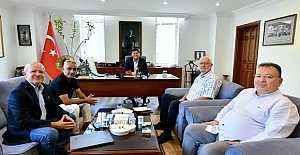 Fethiye Launches International Digital Tourism Campaign with UK-Based Publisher
Fethiye Launches International Digital Tourism Campaign with UK-Based Publisher Highlights from the 3rd Trans-Caspian Connectivity Conference in London
Highlights from the 3rd Trans-Caspian Connectivity Conference in London

